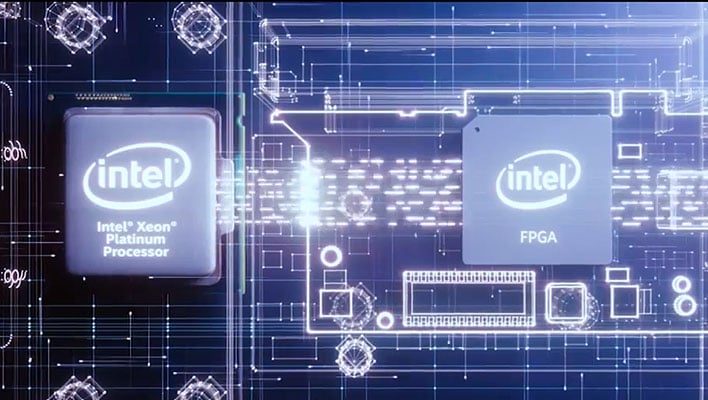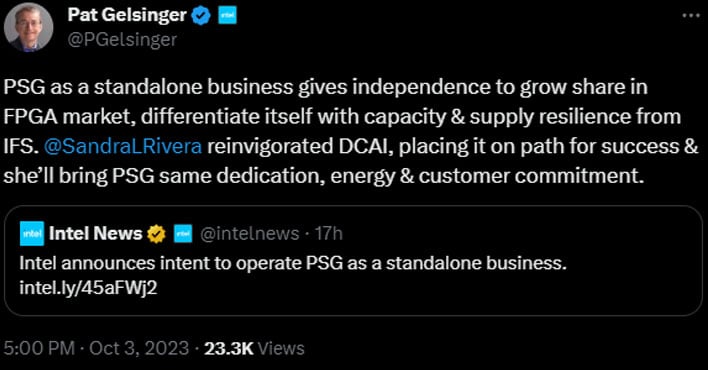Intel Spins Off Programmable Chip Business With FPGA Market Poised For Explosive Growth

Intel's share price is up in after market hours following the announcement of its plans to spin off its Programmable Solutions Group (PSG) into a standalone business, followed by an eventual IPO. The chip maker says the move will give the group the autonomy and flexibility it needs for faster growth and to ultimately be more competitive in the Field Programmable Gate Array (FPGA) market.
The move comes less than a decade after Intel acquired Altera, a Silicon Valley bellwether that made a name for itself producing FPGAs, as well as Programmable Logic Devices (PLDs), embedded processors, and Application Specific Integrated Circuits (ASICs), for $16.7 billion. That transaction occurred under the guidance of Intel's previous CEO Bryan Krzanich.

Intel CEO Pat Gelsinger
When Pat Gelsinger took the reins in 2021, he promised a return to technology and process leadership. Much of that has been focused on Intel's IDM 2.0 strategy. However, Gelsinger has also made moves to make Intel leaner (which is is relative, given that Intel is a juggernaut in the chip industry) and more nimble. A recent example is halting direct investments in its NUC business in favor of a licensing model, starting with ASUS.
As for its PSG spin-off, standalone operations will begin at the start of next year. Intel says it will remain strategically aligned with what's to become a separate business unit, which includes ongoing support and continuing PSG's relationship with Intel Foundry Services (IFS) as they work together to navigate the FPGA market. Then over the next 2-3 years, Intel plans to conduct an IPO for PSG while retaining a majority stake.
"Our intention to establish PSG as a standalone business and pursue an IPO is another example of how we are consistently unlocking more value for our stakeholders. This will give PSG the independence it needs to keep growing share in the FPGA market, differentiating itself with capacity and supply resilience from IFS, and allowing Intel product teams to focus on our core business and long-term strategy," Gelsinger said in a statement.

Intel EVP Sandra Rivera
Intel executive vice president (EVP) Sandra Rivera will leader the effort as chief executive officer (CEO) of PSG, while also continuing to head up Intel's Data Center and AI Group (DCAI) until a replacement is found. Meanwhile, Shannon Poulin will serve as chief operating officer (COO) of PSG.
"This is an incredibly exciting day for me and the PSG team. Reestablishing PSG as a standalone business will enable us to unleash our full potential as we drive for leadership in this demanding and essential part of the semiconductor industry," Rivera said. "Our strategic relationship with Intel will continue to be an advantage as it gives us maximum flexibility in how we address fast-growing markets like automotive and data center and communications."
FPGAs are reconfigurable integrated circuits that can be programmed and reprogrammed after manufacturing for specific tasks. This makes them more flexible than a general purpose central processing unit (CPU) for certain functions. The recent rapid advancement of artificial intelligence (AI) solutions has created a burgeoning market for FPGAs, and this move by Intel gives PSG greater agility to serve that market (and others).
Citing third-party estimates, Intel says the FPGA market is poised to grow from $8 billion in 2023 to $11.5 billion by 2027. Incidentally, the PSG announcement follows Intel's completion of an IPO for its Mobileye business in 2022. It also comes a year and a half after rival AMD completed its acquisition of Xilinx for $49 billion.


